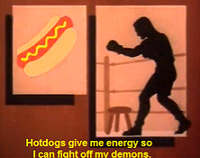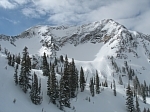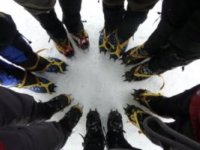I called the Lone Pine Visitor Center and they strongly discourage sleeping in your car and say its illegal. They mentioned the bear issue but it seems like they just want to extract a camping fee. Anybody know if they enforce this? Any recent experiences?
Thanks,
Patrick
Whitney Portal - Sleeping in car at trailhead
-
Taco

- Snownado survivor
- Posts: 6158
- Joined: Thu Sep 27, 2007 4:35 pm
FWIW we usually camp in the Alabama Hills, or nearby along Portal Road. That's free and nobody has "checked on" us before.
-
Rumpled
- Posts: 271
- Joined: Mon Feb 25, 2008 10:57 pm
Horseshoe Meadows is not too far and I think they have one night camping for free.
The portal also has a hiker's camp, I think it's real cheap or free.
The portal also has a hiker's camp, I think it's real cheap or free.
-
Tim

- Posts: 560
- Joined: Tue Apr 08, 2008 8:55 pm
Horseshoe Meadows Campground is $6/night. The Portal's walk-in backpacker's camp is $10/night but it gets heavy usage on the weekends. I've slept in my car before at the Portal and wasn't hassled by anyone. I've seen many other people do it too, but I'm not sure if it's illegal or not. I don't recall any signs saying you can't. The amount of sleep is minimal anyway because most of us are planning to day hike so we get up at like 2 or 3am. I do put all of my food and scented stuff in the bear boxes because of the heavy bear activity.
Inyo National Forest allows disperse camping, like Taco mentioned, so it is legal to pull off somewhere and just camp. This is great if you don't like other people and all the noise they make
Here are the guidelines for disperse camping in the INF:
Inyo National Forest allows disperse camping, like Taco mentioned, so it is legal to pull off somewhere and just camp. This is great if you don't like other people and all the noise they make
Here are the guidelines for disperse camping in the INF:
Most of the land in Inyo and Mono counties is publicly owned. Dispersed camping (camping outside of designated campgrounds) is allowed throughout much of the area. If you plan to backpack into a wilderness area to camp, you will need a wilderness permit; contact a ranger station to obtain one. In all other instances, if you wish to camp outside of developed campgrounds/sites, there are a few things you need to know:
Land Ownership: The three major land-owning agencies in the Eastern Sierra are the Forest Service, the Bureau of Land Management, and the City of Los Angeles. Dispersed camping is allowed on most Forest Service and BLM land. However, camping is prohibited on land owned by the City of Los Angeles.
Maps: Anyone planning a dispersed camping trip should invest in a copy of the Inyo National Forest map, which depicts land ownership as well as roads, streams, trails and other features. The map also shows “restricted use areas” where dispersed camping is not allowed.
Restricted Use Areas: Certain high-use recreation zones, including those along paved roads leading into the mountains, are not open to dispersed camping (see Inyo National Forest map).
Owens River: All land along the Owens River is owned by the City of Los Angeles, and is closed to camping.
Length of Stay: On Inyo National Forest land, you may camp up to 28 days per six months on any one ranger district (there are 4 ranger districts on the Inyo –Mt. Whitney, White Mountain, Mammoth, and Mono Lake). Always check with your local ranger station.
Locating a Dispersed Campsite: Look for an area at the end of a spur road or a pull out that is clear of vegetation and has a hard, compacted surface. These sites might have a primitive fire ring. Stay on established roadways; do not drive off-road to camp. Try to select a campsite at least 100 feet from lakes and streams.
Campfires and Fire Permits: If you plan to build a campfire or use a barbeque or camp stove, you must obtain a campfire permit from a Forest Service, BLM, or CDF office. You must have a shovel and a container of water (for drowning the fire). Clear an area least 5 feet wide all the way around your fire ring down to mineral soil. During times of high fire danger, camp fires are prohibited; always check with the local fire office or ranger station for fire restrictions.
-
hvydrt
- Posts: 494
- Joined: Thu Sep 27, 2007 8:18 pm
I have slept in my truck there a few times. Just keep a low profile and put your food in a bear locker by the trailhead. There is also a backpackers camp by the trailhead, but it is usually full of mega size walmart tents and crying children. 
If you want peace and quite, go to horseshoe meadows.
If you want peace and quite, go to horseshoe meadows.
-
ddmansprty
- Posts: 1
- Joined: Mon Jul 06, 2009 7:10 am
The bears are very active at the portal right now. We had a bear stroll by at dusk, and it made sure our bear box was closed around 9pm and around midnight. I saw a couple people sleeping in there cars near the trailhead, dont think they will bother you if it is just for the night.
-
norma r

- Posts: 707
- Joined: Thu Nov 06, 2008 4:22 pm
i have slept in my car at the TH more times than i can count. if it is not allowed i know of no such ordinance. keep your food in the bear locker and make sure you use ear plugs. the constant door slamming and the talking/laughing of other hikers  getting ready to go, plus the lights of cars passing make "peaceful sleeping" difficult. but hey, who needs more than 3 hrs sleep before a 10-12 hr hike? wimps! truly, if i want peace at altitude i drive up Horseshoe Meadow Road and sleep at the Cottonwood Pass TH. very quiet, very peaceful. the bear lockers there are the low backpacker sized ones so don't bring a large cooler. sleeping in the 'Bamas is also peaceful (and you can sleep with your food) but it doesn't provide you with a night of altitude if you are looking to use that for some acclimation.
getting ready to go, plus the lights of cars passing make "peaceful sleeping" difficult. but hey, who needs more than 3 hrs sleep before a 10-12 hr hike? wimps! truly, if i want peace at altitude i drive up Horseshoe Meadow Road and sleep at the Cottonwood Pass TH. very quiet, very peaceful. the bear lockers there are the low backpacker sized ones so don't bring a large cooler. sleeping in the 'Bamas is also peaceful (and you can sleep with your food) but it doesn't provide you with a night of altitude if you are looking to use that for some acclimation.
-
Melito Irpino
- Posts: 16
- Joined: Mon Oct 27, 2008 11:20 am
Thanks for the replies. I ended up sleeping in my car in the overflow parking. Other than getting only 3 hours of sleep all went well. Next time I might try Horseshoe Meadows or earplugs. Good ideas, Norma. I'll try to throw a trip report together soon.
